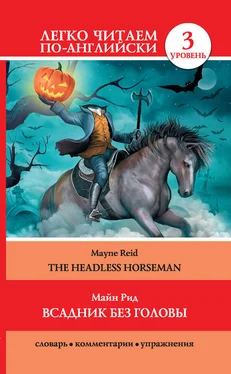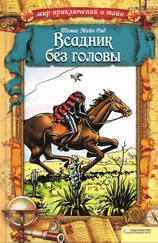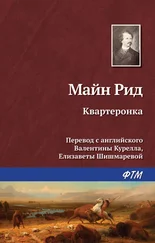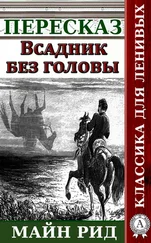“What did you hear, Mr Calhoun?” demands the Regulator Chief. “And where, and when, did you hear it?”
“It was the night my cousin was missing; though, of course, we didn’t miss him till the morning. Last Tuesday night. I’d gone to bed; and thought Henry had done the same. But what with the heat, and the infernal musquitoes, I couldn’t get any sleep.”
It must have been about midnight when he went up the roof of the hacienda to get cool. While he was smoking, he heard voices. There were two of them. They were up the river, a good way off, in the direction of the town.
“There was loud angry talk; and I could tell that two men were quarrelling. As I listened, I recognised one of the voices; and then the other. The first was my cousin Henry’s – the second that of the man who has murdered him.”
“Please proceed, Mr Calhoun! Let us hear the whole of the evidence you have promised to produce. It will be time enough then to state your opinions.”
“Well, gentlemen; as you may imagine, I was no little surprised at hearing my cousin’s voice – supposing him asleep in his bed. But I knew it was his voice; and I was quite as sure that the other was that of the horse-catcher.
“I thought it uncommonly queer, in Henry being out at such a late hour: as he was never much given to that sort of thing. But out he was. I couldn’t be mistaken about that.”
He listened to catch what the quarrel was about; but he couldn’t make out anything that was said on either side. He just heard Henry calling the mustanger by some strong names, as if his cousin had been first insulted. And then he heard the Irishman threatening to make him regret it.
“I should have gone out to see what the trouble was; but before I could draw on a pair of boots, it appeared to be all over.
“I waited for half an hour, for Henry to come home. He didn’t come; but, as I supposed he had gone back to Oberdoffer’s and fallen in with some of the fellows from the Fort, I concluded he might stay there for a while, and I went back to my bed.
“Now, gentlemen, I’ve told you all I know. My poor cousin never came back to Casa del Corvo – never more laid his side on a bed, – for that we found by going to his room next morning.”
Calhoun’s story went far to produce conviction of the prisoner’s guilt. The concluding speech appeared eloquent of truth, and was followed by a clamorous demand for the execution to proceed.
“Hang! hang!” is the cry from fourscore voices.
The judge himself seems to waver. The minority has been diminished – no longer eighty, out of the hundred, but ninety repeat the cry.
A ruffian rushes towards the rope. Though none seem to have noticed it, he has parted from the side of Calhoun – with whom he has been holding a whispered conversation.
He lays hold of the lazo, and quickly arranges its loop around the neck of the condemned man – alike unconscious of trial and condemnation.
No one steps forward to oppose the act. The ruffian has it all to himself or, rather, is he assisted by a scoundrel of the same kidney. [51]
The spectators stand aside, or look tranquilly upon the proceedings. Most express a mute approval. A few seem stupefied by surprise; a less number show sympathy; but not one dares to give proof of it, by taking part with the prisoner.
The rope is around his neck – the end with the noose upon it. The other is being swung over the tree.
Answer the following questions:
1) What did Louise learn at the hotel? Where did she ride the next day?
2) Who did Louise see in the jacale? What did the two women feel?
3) What did Louise do after Isidora rode away?
4) Who was Maurice talking about in his delirium?
5) Who were the people that came to the hut? What did they want?
6) Was Calhoun’s story true?
7) What sentence was passed upon Maurice? Who was about to carry it out?
Thank heaven, there is an interruption to that stern ceremonial of death.
“A woman! a beautiful woman!”
It is only a silent thought; for no one essays to speak. Like a meteor she glides on without giving a glance on either side – without speech, without halt – till she stoops over the condemned man.
With a quick clutch she lays hold of the lazo; which the two hangmen, taken by surprise, have let loose.
Grasping it with both her hands, she jerks it from theirs. “Texans! cowards!” she cries, casting a scornful look upon the crowd. “Shame! shame!”
They cower under the stinging reproach. She continues —
“A trial indeed! A fair trial! The accused without counsel – condemned without being heard! And this you call justice? My scorn upon you – not men, but murderers!”
“What means this?” shouts Poindexter, rushing up, and seizing his daughter by the arm. “You are mad – Loo! How come you to be here? Did I not tell you to go home? Away – this instant away; and do not interfere with what does not concern you!”
“Father, it does concern me!”
“How? – oh true – as a sister! This man is the murderer of your brother.”
“I will not – cannot believe it. There was no motive. O men! if you are men, do not act like savages. Give him a fair trial, and then – then—”
“He’s had a fair trial,” calls one from the crowd, who seems to speak from instigation; “Never a doubt about his being guilty. It’s him that’s killed your brother, and nobody else.”
“Justice must take its course!” shouts one. “We are sorry to disoblige you, miss; but we must request you to leave. Mr Poindexter, you’d do well to take your daughter away.”
“Come, Loo! You must come away. You refuse! Good God! Here, Cash; take hold of her arm, and conduct her from the spot. If you refuse to go willingly, we must use force, Loo. Do as I tell you. Go! Go!”
“No, father, I will not – till you have promised – till these men promise—”
“We can’t promise you anything, miss – however much we might like it. It’s not a question for women. There’s been a crime committed – a murder, as you yourself know. There’s no mercy for a murderer!”
“No mercy!” echo a score of angry voices. “Let him be hanged – hanged– hanged!”
The lady is led aside – dragged rather than led – by her cousin, and at the command of her father. She struggles in the hated arms that hold her – wildly weeping, loudly protesting against the act of inhumanity.
She is borne back beyond the confines of the crowd – beyond the hope of giving help to him, for whom she is willing to lay down her life!
The lazo is once more passed over the branch; the same two scoundrels taking hold of its loose end.
Now nearer than ever does the unfortunate man seem to his end. Even love has proved powerless to save him! What power on earth can be appealed to after this?
The hangmen, too, appear in a hurry – as if they were in dread of another interruption. They manipulate the rope with the ability of experienced executioners.
“Now then, Bill! Are you ready?” shouts one to the other. “Let’s go at it again – both together.”
“No you don’t!” calls out a loud voice; while a man of colossal frame, carrying a six-foot rifle, is seen rushing out from among the trees, in strides that bring him almost instantly into the thick of the crowd.
“No you don’t!” he repeats, stopping over the prostrate body, and bringing his long rifle to bear upon the ruffians of the rope. “You, Bill Griffin; pull that piece of horse-hair but the eighth of an inch tighter, and you’ll get a blue pill in your stomach as won’t agree with you. Drop the rope! Drop it!”
Zeb Stump was known to nearly all present; respected by most; and feared by many. Among the last were Bill Griffin, and his fellow rope-holder.
Читать дальше
Конец ознакомительного отрывка
Купить книгу








